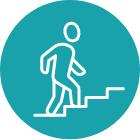Recognise the symptoms
If you think you are experiencing symptoms, speak to your GP

If you think you are experiencing symptoms, speak to your GP

Giving yourself the knowledge to spot the symptoms of heart failure is a great first step towards fighting the impact the condition could have on a life. The earlier we can spot the signs of heart failure; the sooner healthcare professionals can diagnose and intervene.
There are three main symptoms associated with heart failure:1

BREATHLESSNESS
When you find yourself short of breath either at rest or while being active. This may get worse when lying down or at night.1

EXTREME TIREDNESS
Otherwise known as fatigue. You may feel more drained than usual and this may affect you most of the time.1

SWOLLEN LEGS OR ANKLES
This is known as oedema. It’s caused by a build-up of fluid and you may notice it gets worse later on in the day.1
A persistent cough • Wheezing • Loss of appetite • Bloating • Unexplained weight gain or loss • Confusion • Dizziness and fainting • A fast or irregular heartbeat
If you have any of these symptoms you should visit your doctor. If they think you are presenting symptoms of heart failure, they might offer you a simple blood test called NT-proBNP (N-terminal pro-B-type natriuretic peptide) – this is a hormone released into the blood when the heart is under stress.
This test is very useful in evaluating how likely a heart failure diagnosis is. The results can help to guide your doctor’s next steps, and how to investigate the origin of your symptoms in further detail. They may need to refer you to a cardiologist for further tests, such as an echocardiogram.
Another hormone which could be measured in the blood sample instead of NT-proBNP is BNP (B-type natriuretic hormone). BNP is closely related to NT-proBNP and serves the same purpose, however, NT-proBNP is recommended due to several advantages.3
Heart failure is often a progressive condition.1 As such, it is important to detect the disease early and implement an appropriate management plan. There are interventions which can help manage the condition.

Your medical practitioner (normally your GP) may perform a clinical examination and evaluate your medical history. If they believe your symptoms could be due to heart failure, they may offer you blood tests, including the NT-proBNP test, and further tests as needed.
A type of ultrasound imaging called echocardiography should be performed by an experienced healthcare professional3 to evaluate heart function and detect any abnormalities. This is often carried out in a hospital setting.
One or more of the following tests may also be performed in order to detect worsening factors and/or other conditions:1
These tests can help establish if your symptoms may be due to a lung problem or if this is a contributing factor.4
This test checks your heart’s rhythm and electrical activity through sensors attached to your skin.5
This is when an image is taken of the inside of your body, such as your chest, using a type of radiation that can pass through the body. X-rays are usually carried out by specialists known as radiographers in a hospital setting.6
There are a variety of blood tests with a wide range of uses. They can be used to check how well your organs are working, or simply assess you overall health.7
References
UK | July 2023 | 131149-1
Fighting Failure is a disease awareness campaign that has been developed and funded by Novartis Pharmaceuticals UK Ltd.
© 2023 Novartis Pharmaceuticals UK Ltd.
Novartis Pharmaceuticals UK Limited is a private limited liability company registered in England and Wales under number 119006 Registered office 2nd Floor, The WestWorks Building, White City Place, 195 Wood Lane, London, W12 7FQ.
Reporting side effects
If you get side-effects with any medication you are taking, talk to your doctor, pharmacist or nurse. This includes any possible side effects not listed in the information leaflet that comes in the pack. You can report side effects via the Yellow Card Scheme at https://yellowcard.mhra.gov.uk/ (UK). By reporting side effects you can help provide more information on the safety of your medication.
UK | August 2024 | 215197-2

Help us raise awareness
I’ve just learnt about the impact heart failure has in the UK. I’m sharing this so we can all fight heart failure together to improve care across the UK.
Fighting Failure is a disease awareness campaign that has been developed and funded by Novartis Pharmaceuticals UK Ltd.
#FIGHTINGFAILURE